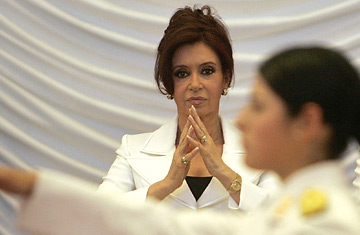
Argentina's President Cristina Fernandez de Kirchner.
It's been a bumpy ride so far for Argentina's new president, Cristina Fernandez de Kirchner. And barely more than a week has passed since she was inaugurated. Hailed as Argentina's new Evita, Fernandez had been in office for three days when her first crisis broke. It originated in faraway Miami, where Assistant U.S. District Attorney Thomas Mulvihill said in court that the FBI had recorded alleged Venezuelan agents saying that $800,000 confiscated by Argentine customs authorities in Buenos Aires four months ago was actually an illegal campaign contribution from Venezuelan President Hugo Chavez to Fernandez' electoral campaign.
It is a particularly sensitive issue for Fernandez, who ran on her record as a fiery anti-corruption crusader while she was in Argentina's Congress. It also complicates her attempts to mediate between the U.S. and its bete noir, Venezuelan President Hugo Chavez.
The FBI's recording was provided by Venezuelan-American businessman Guido Antonini, the Miami resident who had allegedly attempted to smuggle the $800,000 into Argentina on Aug. 4 on a flight from Caracas, Venezuela. He flew on a charter by Argentina's state oil company. Antonini, who had allegedly fled Argentina for his Key Biscayne, Florida, home, allowed himself to be wiretapped by the FBI and the information he gathered led to the arrest of Venezuelan businessmen Franklin Duran and Carlos Kauffmann. Mulvihill said that Antonini had been offered $2 million by an unnamed party to hide the provenance and the beneficiary of the funds.
The Venezuelan businessmen were arrested on charges of acting on behalf of a foreign government without having registered as agents of that government with U.S. authorities. Hearings in the case started in Miami earlier this week. Mulvihill informed the court on Dec. 12 that "the money was meant for the campaign of Cristina Kirchner. These defendants were instructed to keep the role of Venezuela in the matter quiet."
The reaction from Fernandez and many in Argentina has been swift and aimed directly at the U.S., which is seen in Argentina as having masterminded the money-smuggling operation to smear the new president. In a public statement, she labelled the accusations "a trash campaign" by Washington against her. The sentiment has been taken up by the media, which has called Antonini a U.S. agent who planted the $800,000 as part of an operation against Fernandez.
The Argentine Congress fell in line, approving a motion repudiating the U.S. for what it called "a nefarious intelligence operation with the direct consequence of debasing the presidential institution of our nation." Congress furthermore demanded that the United States extradite Antonini to Argentina for the ongoing investigation in a Buenos Aires court into the smuggling operation. There has been a warrant for his arrest issued by an Argentine court in connection with the attempt to smuggle in the $800,000.
Although the motion was quickly approved thanks to the government's wide majority, some opposition voices cast doubt on the conspiracy theory. Maria Estenssoro of the Civic Coalition said that "ranting at the empire is just a smokescreen. The problem isn't a trash operation from the U.S., the problem is the trash campaigns at home." Civic Coalition party leader Elisa Carrio, Fernandez's rival in October's presidential elections, said that "the United States is not responsible for the crimes of corruption committed by the governments of Venzuela and Argentina."
The U.S. Ambassador to Buenos Aires Anthony Wayne was called in by the Argentine Foreign Ministry on Tuesday and told that "we have been surprisingly and unjustly offended." However, in diplomatic circles, the scandal is seen as emanating from an independent judicial system that has inadvertently put a brake on the warming relations that Washington hoped to enjoy with Fernandez, who is perceived to be more moderate in her support for Chavez than her husband and predecessor Nestor Kirchner.
All the political dust kicked up by the allegations were in contrast to the smooth ceremony at her swearing in. The traditional presidential sash and baton of power were handed to her by her husband, the outgoing chief executive. There were no questions about popular support: Fernandez was more than 20 percentage points ahead of her closest rival. Kirchner's own accession four years before had been much less smooth. Having lost in the first round of voting against former President Carlos Menem, he became president only when Menem bowed out of the second round, acceding to office with only 22% of the vote. So far, in the current scandal, the media and most of the public have gathered around to support the new President. But if these first few days are any indication, it's going to be a bumpy four years for Argentina's new Evita.
